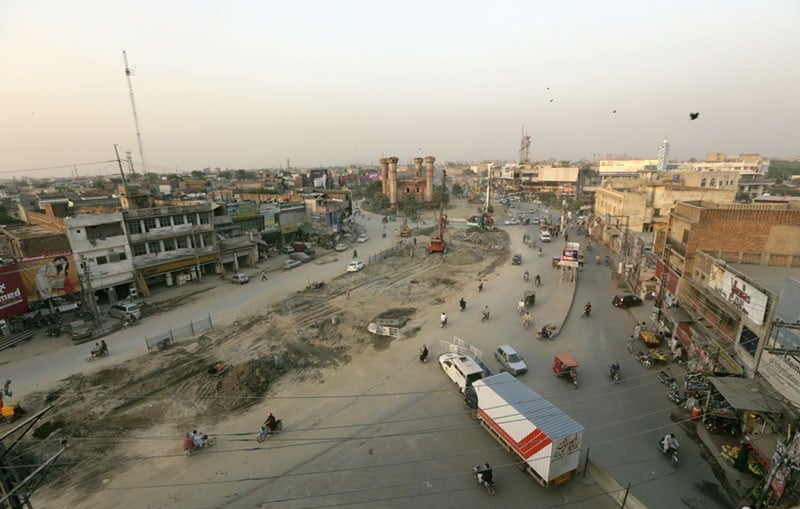
Can the destruction of Lahore in the name of development be blamed on the ignorance and arrogance of a few men or is it an outcome of a much larger phenomenon which encapsulates both the structure of the state as well as the condition of society?

When somebody is attacked with acid, the defacing or scarring is not just physical. Rather it is a blow to the soul that uses facial expressions to communicate with the wider world. So, how would one imagine the planned scarring of a 2000-year-old living city of Lahore -- with its history of knowledge and culture, with ancients who introduced zero in mathematics, and with its great resistance poets of the 20th century.
Can this destruction of Lahore be blamed on the ignorance and arrogance of a few men who run Punjab like an inherited kingdom or is it an outcome of a much larger phenomenon which encapsulates both the structure of the state as well as the condition of society?
The purpose of this article is to explore our current predicament where despondency and cynicism have been internalised to the extent that all sections of society seem helpless to stop the impending destruction of Lahore.
During a car ride from her home to the Lahore Press Club for a press briefing on the Orange Metro Train, Salima Hashmi, former principal of the National College of Arts (NCA) and an educationist who has built multiple institutions, said that the systematic destruction of citizen collectives, aka civil society, started long ago when hundreds of progressive professors were thrown out of colleges and universities during the Zia era, student unions were banned, labour unions were decimated and they never picked strength again.
Thus, the knowledge culture where real teaching started only when the class actually finished, through informal interaction between teachers and students, instead gave way to a scenario where a PhD student can be rusticated for exercising the academic freedom of critique, or where the freedom of expression conference organised by the Punjab University has to take place outside the campus in a five-star hotel.
The depth of this destruction can be assessed by the fact that when existing student unions were invited multiple times to hear the seriousness of the Orange Train issue, not one showed up. Academic faculties of universities have barely shown a response when contacted and invited. Is it because not a single active academic association of social scientists exists in the city where they would interact not just as academics, teachers and scholars but also as citizens?
Or is it because even where associations and unions exist, these can’t imagine issues beyond their limited trade? Thus, the 2015-16 Punjab Development Budget’s figures of Rs0.61 billion for labour, Rs55 billion for education, Rs30 million for health and a mammoth Rs123 billion for roads, transport and buildings, in addition to the Rs166.4 billion loan for Orange Train do no not serve the right purpose.
What scholars have come to define as ‘Enlightened Interest’, where self-interest is bridged with a much larger societal interest, in actuality does not exist in our limited civil society. Further, this role cannot be substituted by patron-client, and non-membership based funded NGOs, whose employees are but development professionals, rather than organised political activists. While this explains the hegemony of the state over society, it does not explain the functioning of the state which allows this destruction unless issues like importance of postings, lack of tenure security, and even seniority among bureaucracy are included in the picture.
Bureaucracy has been cowed such that it can’t fulfil the ideals set by Confucius, and has instead been pushed to what Hannah Arendt described as ‘banality of evil’, explaining bureaucracy’s fulfillment of holocaust orders during the Hitler reign over Germany.
It is in this background of spinelessness and unprofessionalism of the coterie of bureaucracy around the king that I.A. Rehman, standing along with another unblemished veteran, Hussain Naqi, a century of struggle among them, told me "Zaalim Log Hain" (these people are cruel) after a seminar on Orange Metro, indicating the utter helplessness of citizens to stop the state from destroying the beloved city of over 11 million people.
But what about the elite that has personal relations with decision makers? Do they not know what will be lost or are they too beholden to the state that gives them business? Here, Sandeep Pandey, the Indian activist’s analysis of Gujarat massacre, "that institutions could not take a stand because they had a stake with the government", comes to mind. This explains the deafening silence of the elite, who like the bureaucracy can’t imagine any sacrifice for this cause. Thus, one should not expect much from corporations, firms and businesses, whose revenue comes from various state projects or advertisements.
However, the twenty plus organisations, various teachers, professors doing research on Orange Metro project, citizens doing mobilisation, journalists writing about it, youth taking it to social media, and lawyers doing pro-bono cases of the displaced make up the #RastaBadlo citizens collective.
The struggle has been knocking on all doors including the opposition political parties, who have yet to publicly take an active stand. But, it is gathering pace and plans to break the silence in Lahore on March 15, to say out loud what Gulzar Haider, the Dean of BNU’s School of Architecture, has stated: "This self-referential arrogance of the heritage-demolishers claiming public convenience and economic development is completely indefensible and therefore must be condemned and resisted through all means necessary".